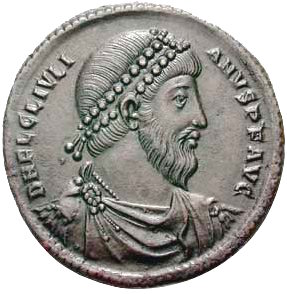 W
WJulian was Roman emperor from 361 to 363, as well as a notable philosopher and author in Greek. His rejection of Christianity, and his promotion of Neoplatonic Hellenism in its place, caused him to be remembered as Julian the Apostate by the Christian Church.
 W
WThe Battle of Brumath in 356 AD was part of Roman Emperor Julian's campaigns against the Germanic tribes. Following the Battle of Reims, Julian's forces pursued several Germanic war bands through the Gallic countryside. Outside Brocomagus (Brumath), one war band met Julian in open battle and the Romans were victorious.Hearing therefore that Strasburg, Brumath, Saverne, Seltz, Speyer, Worms, and Mayence were held by the savages, who were living on their lands, he first of all seized Brumath, but while he was still approaching it a band of Germans met him and offered battle. Julian drew up his forces in the form of a crescent, and when the fight began to come to close quarters, the enemy were overwhelmed by a double danger; some were captured, others were slain in the very heat of the battle, and rest got away, saved by recourse to speed.
 W
WThe Battle of Ctesiphon took place on May 29, 363 between the armies of Roman Emperor Julian and an army of the Sasanian Empire outside the walls of the Persian capital Ctesiphon. The battle was a Roman victory, but eventually the Roman forces found themselves unable to continue their campaign as they were too far from their supply lines.
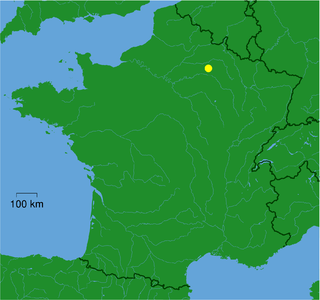 W
WThe Battle of Reims or Battle of Durocortorum was fought in 356 between the Western Roman army led by Western Roman Emperor Julian and the Alemanni. The Alemanni were victorious.And after staying there [ Troyes ] a short time, out of consideration for this tired soldiers, he felt that he ought not to delay, and made for the city of Rheims (Durocortōrum). There he had ordered the whole army to assemble with provisions for a month and to await his coming; the place was commanded by Ursicinus' successor Marcellus, and Ursicinus himself was directed to serve in the same region until the end of the campaign. Accordingly, after the expression of many various opinions, it was agreed to attack the Alamannic horde by way of the Ten Cantons [ Dieuze] with closed ranks; and the soldiers went on in that direction with unusual alacrity. And because the day was misty and overcast, so then even objects close at hand could not be seen, the enemy, aided by their acquaintance with the country, went around by way of a crossroad and made an attack on the two legions bringing up the rear of the Caesar's army. And they would nearly have annihilated them, had not the shouts that they suddenly raised brought up the reinforcements of our allies. Then and thereafter, thinking that he could cross neither roads nor rivers without ambuscades, Julian was wary and hesitant,
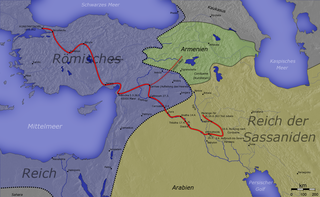 W
WThe Battle of Samarra took place in June 363, during the invasion of the Sasanian Empire by the Roman Emperor Julian. After marching his army to the gates of Ctesiphon and failing to take the city, Julian, realizing his army was low on provisions and in enemy territory started marching towards Samarra.
 W
WJulian's Persian War, or the Perso-Roman War of 363, was the last undertaking of the Roman emperor Julian, begun in March 363. It was an aggressive war against the Sasanian Empire ruled by Shapur II.
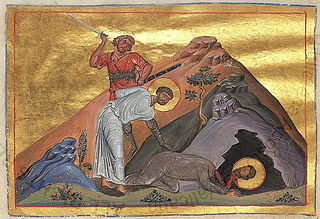 W
WSaints Juventinus and Maximus were members of the imperial guard of Emperor Julian. Their feast day is 25 January.
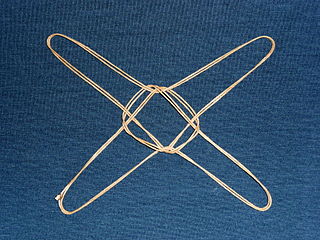 W
WOribasius or Oreibasius was a Greek medical writer and the personal physician of the Roman emperor Julian the Apostate. He studied at Alexandria under physician Zeno of Cyprus before joining Julian's retinue. He was involved in Julian's coronation in 361, and remained with the emperor until Julian's death in 363. In the wake of this event, Oribasius was banished to foreign courts for a time, but was later recalled by the emperor Valens.
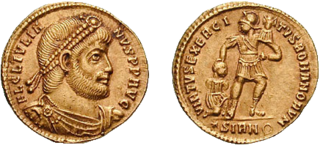 W
WThe Battle of Strasbourg, also known as the Battle of Argentoratum, was fought in 357 between the Western Roman army under the Caesar Julian and the Alamanni tribal confederation led by the joint paramount King Chnodomar. The battle took place near Strasbourg, called Argentoratum in Ammianus Marcellinus' account, Argentorate in the Tabula Peutingeriana.